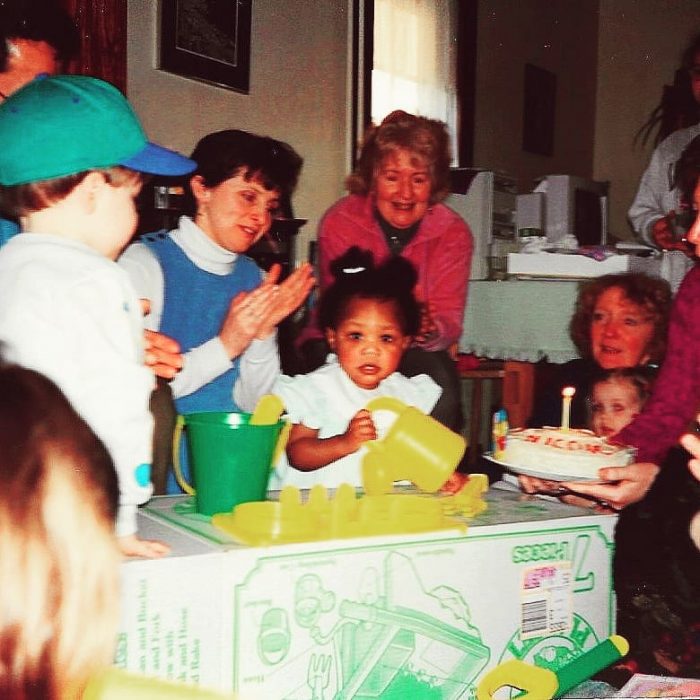As young as five years old, I remember feeling uncontrollable anger when asked to explain myself.
“Who is that?” “Why is your mom white?” and “Why don’t you act Black?” were questions that my elementary school classmates never hesitated to ask.
I would immediately freeze, using a fake smile to distract them as my mind raced to find an answer that would protect my happy-go-lucky persona for one more day. After a brief pause, I would recite a script that my mother and I had created years earlier: “I am adopted. That’s why I look different from my mom.” The most original follow-up question to this response was, “Oh! Like little orphan Annie?!”
I am a Black Transracial Adoptee (TRA). Growing up, I always knew there was a term for my identity. Unfortunately, most people still have no idea what the word transracial means, or its importance.
According to www.USLegal.com, “Transracial Adoption (TRA) refers to the process of placing a child who is of one race or ethnic group with adoptive parents of another race or ethnic group.” The word “transracial” can be broadly used to describe people of color (POC) who have been adopted or fostered, usually by white adoptive parents (WAPs). A transracial adoption is also transcultural, with the adopted child coming from a different country or culture, as well as a different racial background.
Existing as a TRA is a unique experience that, by nature, comes with challenges. As a child, I constantly craved love and safety, but was never taught to listen to my own inner needs. My connection to identity, race, biological family, and sense of belonging was taken away from me the moment I was put up for adoption.
Adoptee voices are often muted, and narratives of transracial adoption tend to be idealized. Take, for instance, the trend on social media to martyr adoptive parents—which consistently bothers me—when referencing adoption: the idea that adoption is only beautiful and joyous. The public denies the fact that adoption is also deeply personal (for the adoptee, the birth family, and the adoptive parents), sad, and confusing. The idea of adoptees being “lucky,” “chosen,” and “grateful” should not be the focus of our culture’s conversations about adoption.
For many adoptees, adoption itself is our first trauma. We spend the rest of our lives working through this trauma.
In 2nd grade, I was partnered with a white girl in my class. About five minutes into this new seating arrangement, she turned to me casually and said, “My mom told me that black people are ugly.” I immediately burst into tears and ran into the hallway, ignoring the yells from my teacher.
I was scared. I was angry. I was hurt. I thought this girl was going to be my new friend. I didn’t think she was ugly. Why did her mom think I was? And why was the girl telling me about it? Am I ugly? She’s right, I am ugly.
Afterward, my white teacher—who I grew up across the street from—said something to try and comfort me, but her attempt was not memorable. The damage was done, and now I had even more proof that I was different; and different was bad because being different made me unlovable.
After this, I began to push myself with a new goal: I never wanted to be embarrassed in class again. I tried to become perfect, “better-than,” but I knew deep down that I was not. I knew that being “perfect” was a lie—that I was a lie.
Flash forward to eighth grade. My mom told me that I would not be going to public high school because the school all my friends would be going to was “dangerous” and could not provide me with the level of education I needed to succeed. Because I was Black, my mother said, I would need to use education as a tool to be better than other kids—or at least to keep up with the rich white kids.
According to my mother, my future heavily depended on the college that I would attend, what job I got, and how much money I would make.
After my mother finished her monologue, I burst into tears—already picturing how horrible my next four years would be. I envisioned wearing a gross plaid skirt, an itchy sweater, and not being able to make friends. Private school kids were white, rich, and weird—definitely not “cool,” or not cool in the way that I spent my middle school years trying to be.
At boarding school, I was bullied and became addicted to losing weight. I refused to be the ugly Black girl. There weren’t many Black people who attended the school, but there were tons of Nigerians, Koreans, and other wealthy international students.
I was in complete isolation, knowing that I was one of the poorest students in my class and coming to terms with the fact that everyone else knew that I was.
I dealt with this pain by calling my mom every day and crying to her on the phone. She was sympathetic, but always focused on finding solutions. I knew the only real solution would be to return home and go back to public school—to the original discomfort that I already knew. But leaving boarding school was never an option in my mom’s eyes. The struggle would be worth it, right?
How can white adoptive parents support a TRA and create a safer space? Through having conversations about race and culture in the home—amongst themselves and with their biological children—and modeling openness to their TRA. If done consistently and gently, TRAs learn from their WAPs that speaking about differences surrounding race, culture, and identity is a reality.
Being “colorblind” is not an acceptable way to view race; and claiming to be colorblind actually communicates to others that differences are negative. I ask people to recognize that being one of the few people of color in every space we enter is something that TRAs are conditioned to expect.
In my case, this expectation has led to repressed anxiety and trauma that manifest internally and externally as anxiety, depression, and manic energy, with a loss of identity (for more information, research Complex PTSD/PTSD-C).
Material wealth and white American family values do not compensate for the constant lack of representation that TRAs are faced with in their homes and communities. White privilege and white saviorism are not always intentional, but ever-present. Although white adoptive parents may make efforts to have their TRA attend diverse schools, take part in extracurricular activities, and maintain an open relationship with their biological families, TRAs still need more support.
White adoptive parents should also look to other community members who share the TRA’s racial and/or cultural identity. These community members may have advice and present an opportunity for the TRA to create a relationship with someone who looks like them.
That being said, the most helpful thing for me has been connecting with other TRAs, as we understand and validate each other’s experiences. Adoption challenges any adoptee’s identity, but TRAs have additional layers of identity issues to recognize and tackle.
Full acceptance from any community may be difficult for a TRA to find. However, thanks to the internet and social media, more groups of TRAs are bonding together to heal their traumas while forming a healthy sense of identity.
I am beginning to heal. For me, this looks like finding other transracial adoptees. It looks like listening to my body for instructions, and following only those instructions. This recent energy shift came after repetitive depressive episodes, moving away from conditional friends, and committing to gentle changes in my thought patterns.
As I continue to heal, I realize that I don’t have to edit my emotions or experiences for anyone. I don’t need to prove my happiness or prioritize other people’s comfort.
As a friend told me recently, “Tone it down for no one.” I felt that. So I am now prioritizing myself, the person who’s been there for me all along.
When you’re silent long enough, you forget that you even have a voice. And going forward, I will not censor myself—because I choose love over fear.
As Maggie Kuhn says, “Speak your mind even if your voice shakes.” Well Maggie, I’m working on it.
Editor’s note: If you are a transracial adoptee and/or interested in connecting with Nicole, follow her on Instagram @littleorphan_nicoleb







Read 5 comments and reply